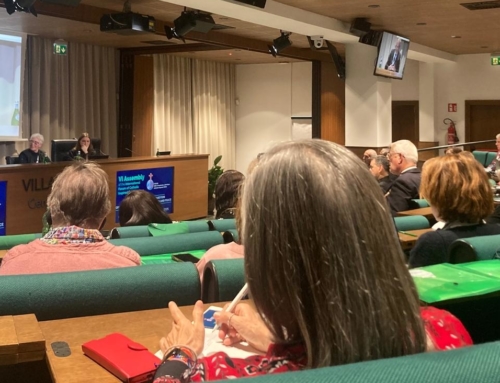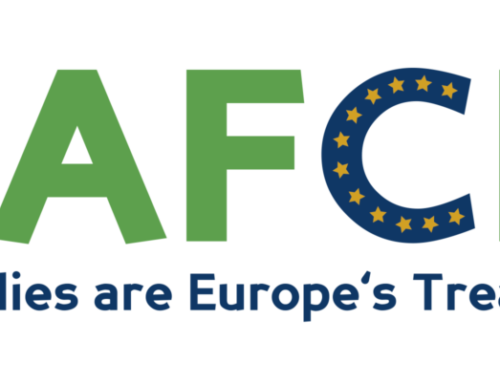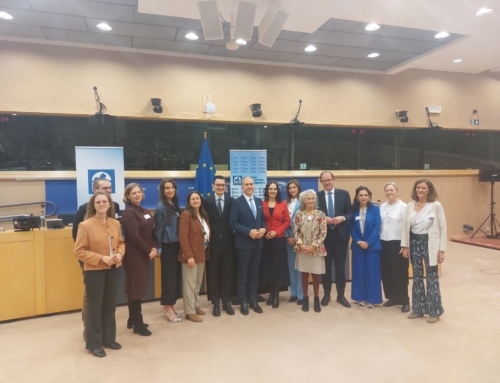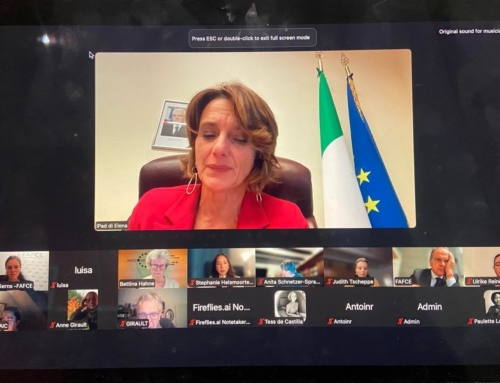Brussels 25 February 2025
FAFCE participated for the 1st time in the CEU Bioethics Congress in Madrid
Last week, on February 18, Teresa Gerns, FAFCE UN and CoE Advocacy Director, spoke at the 8th edition of the National Congress on Bioethics at the CEU San Pablo University in Madrid. The event, held under the slogan “The Service of Life and the Person,” coincided with the 30th anniversary of Evangelium Vitae, the encyclical by St. John Paul II. It served as a platform for reflecting on human and ethical values in the context of scientific progress.
The congress started on Monday, February 17, with a roundtable discussion moderated by Carmen Fernández de la Cigoña, Director of the CEU Institute of the Family. On the following day, Concepción Espejel Jorquera, Judge of the Constitutional Court, elaborated on her dissenting opinion regarding the ruling on abortion law. Tuesday morning Álvaro Ortega Madero, President of +Vida and Director of Fertilitas, and Teresa Gerns, representing FAFCE, discussed in a round table different matters on the protection of the human dignity.
FAFCE reiterated that matters concerning life, gestational surrogacy, and euthanasia fall outside the European Union’s direct competencies, unlike sectors such as fisheries or trade. Institutions at the EU level are tied to the principle of subsidiarity, which protects member states to legislate within their jurisdictions. Despite this legal framework, these bioethical issues continue to be debated for political motives. FAFCE expressed concern over the European Parliament’s increasing efforts to incorporate abortion into its policies. FAFCE gave several examples, such as a EP resolution from 2024 advocating for the inclusion of abortion as rights in the EU’s Human Rights Charter, arguing that such an initiative demands actions that exceed the EU’s competencies. FAFCE clarified that this resolution had no legal repercussions, and that abortion cannot be added to the EU Charter as it is contrary to the spirit of the Charter as well as to the fundamental rights that it already recognises.
Vincenzo Bassi says: “In the context of a demographic winter, European institutions and member states must pursue policies that foster intergenerational solidarity. To achieve this they must promote the choice of life, by informing and resourcing the family which serves the common good. It is possible to be in favour of life and in favour of choice too – the choice for women to have children and for communities to grow through new lives.”
FAFCE sincerely appreciates the University CEU San Pablo for the opportunity to take part in such an engaging discussion at the faculty of economics and international relations. Our thanks go especially to our new Spanish Members, the ACdP,to whom we are very grateful for the collaboration and engagement to defend the family and the common good.
Link to the video of the Conference: https://www.youtube.com/watch?v=Bh_MOU1DOkY
FAFCE previous communications on the human life and EU competences:
- 2024 PRESS RELEASE Abortion vote at European Parliament an “ideological declaration”, says FAFCE
- 2024 FAFCE comment on the Inclusion of the right to abortion in the EU Charter of Fundamental Rights
- 2022 European Parliament recent positions on care, mental health at work, women’s poverty, and abortion
- 2023 FAFCE Contribution to the EU Committee of Regions on “Stopping gender-based violence – cities and regions leading the way”
- 2021 Matic Report: let’s respect subsidiarity and stay focused on the future
- 2021 FAFCE Contributes to Public Consultation on Gender-Based and Domestic Violence
- 2021 The “sexual and reproductive health and rights” of women discussed at the European Parliament
- 2013 Press release | Over 60 000 citizens ask the EU not to support abortion. Will the European Parliament listen?
- 2013 Press release | Contradictory EU Parliament Report affirms subsidiarity on “Sexual and Reproductive Health and Rights”








